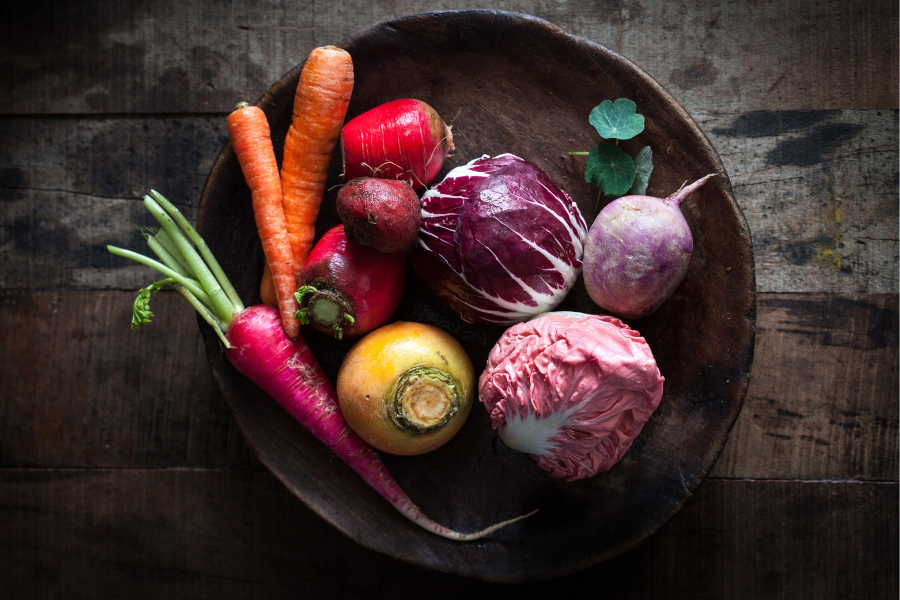The Top Reasons to Grow Your Own Food: Boost Your Health, Reduce Stress, and Improve Your Well-Being

Have you ever thought about how long it takes for produce to reach your plate after it's been harvested? The truth is, by the time fruits and vegetables make it to the supermarket, they may have lost a significant amount of their nutritional value. And that is only one of many reasons why it's important to consider growing your own food. It provides a source of fresh and healthy produce and allows you to control what goes into your food and how it's grown. In addition, gardening is not only a sustainable practice but can also be a therapeutic and stress-relieving activity that can improve your mental well-being. Reducing and managing stress is our favorite form of hair loss prevention, so in this blog, we'll explore the benefits of growing your food and how it can help you improve your diet, stress levels, and overall quality of life.
The soil on commercial farms lacks nutrients.
Population growth is beautiful, but the shift towards industrial agriculture to feed more people has prioritized yield and profit over nutritional value. As a result, many crops are instead grown for their size, appearance, and shelf life. And while synthetic fertilizers make sense for farmers looking to increase their yields, it is a short term solution as over time they can cause soil acidity and nutrient depletion, which can harm plant growth and reduce crop yield down the line. Synthetic fertilizers can also contribute to the production of greenhouse gases, which can contribute to climate change.
If you are lucky enough to have space to grow food outdoors (even if it’s a small patio pot), you can amend your soil with organic fertilizers and compost to improve the nutritional value of the food you grow. While organic fertilizers work slower, are not as concentrated as synthetic fertilizers, and can be more expensive, they can improve soil health and fertility over time feeding the soil for longer, leading to better plant growth and crop yield. Organic fertilizers can also help to reduce soil erosion and conserve water.
Humans should be eating seasonally.
While grocery stores source “fresh” produce from all over the world because of demand, we are not supposed to have access to all fruits and vegetables all the time. Did you know eating seasonally from your garden ensures you consume the proper nutrients when your body needs them most? For example, fall and winter are challenging for our immune systems, and citrus fruits high in vitamin C are in season at this time. And when it is homegrown, you can harvest it at the peak of ripeness. As a result, it will contain more nutrients than the produce picked early, shipped long distances, and stored for weeks. Eating seasonally reduces your carbon footprint, and encourages a diverse and varied diet, which can lead to better overall health and nutrition.
Americans aren’t getting enough fiber.
Unfortunately, the average American’s intake of fiber is less than half the recommended daily amount. Why do we need it? A high-fiber, plant rich diet helps to feed healthy gut bacteria and boost immunity. Plants containing fiber feed the little fighter cells inside us all to keep us healthy and strong.
A high fiber diet can reduce the risk of chronic diseases such as heart disease, stroke, and diabetes. A study published in the Journal of the American Medical Association found that people who ate more dietary fiber had a lower risk of developing these diseases compared to those who ate less fiber. Fiber also helps regulate blood sugar levels, which is important for people with diabetes. Furthermore, fiber promotes satiety and can help with weight management, as it helps you feel full for longer periods of time.
Luckily, fiber is found in virtually every plant you can grow in your garden, so having plants to harvest regularly from home is an excellent way to add more fiber to your diet.
And if space is your main excuse, gardening is not only limited to your backyard or patio. If you lack access to outdoor space, there are ways to grow leafy greens in your home in a sunny window or with artificial lights. For example, a healthy salad of lettuce, radish, and tomato can be grown indoors under LED lights all year round. And studies show that raising houseplants improves mental and physical well-being by improving air quality and cognitive function. If you prefer to garden away from home, there are most likely community gardens/nurseries in your area seeking volunteers. Which leads to our next point…
Gardening is beneficial to your mind, body, and spirit.
Gardening is also a physical, mindful, and social activity that releases chemicals in the brain to reduce stress, improve mood, promote social connection, and aid relaxation. Tending to plants daily can even help you break a sweat. From feeding/watering to seed sowing and transplanting, gardening requires your whole body to be present in the moment, focusing only on the task at hand. It also provides an opportunity to connect with nature and like-minded members of your community who share a love for gardening. You can meet new people through seed exchange programs, volunteering at community gardens, and plant share groups on social media or in your community.
And can we talk about how gardening can provide a sense of accomplishment? Seeing the results of your efforts through a thriving vegetable garden can be a very satisfying and rewarding experience. Such feelings are accompanied by a release of chemicals in the brain including dopamine, serotonin, oxytocin, and endorphins which can all play a role in modulating the stress response and cortisol release.
For example, dopamine and serotonin can have a calming effect on the brain, which may help to reduce stress levels. Oxytocin has been shown to reduce cortisol levels in response to stress and increase feelings of trust and social bonding. Endorphins, which are natural painkillers, can also have a stress-reducing effect by promoting feelings of pleasure and relaxation.
If gardening can help reduce stress while promoting a plant-rich diet to help boost your hair growth and overall wellness, what are you waiting for? Sow some seeds this season to help reduce stress, and spread wellness to your family and friends.





Comments